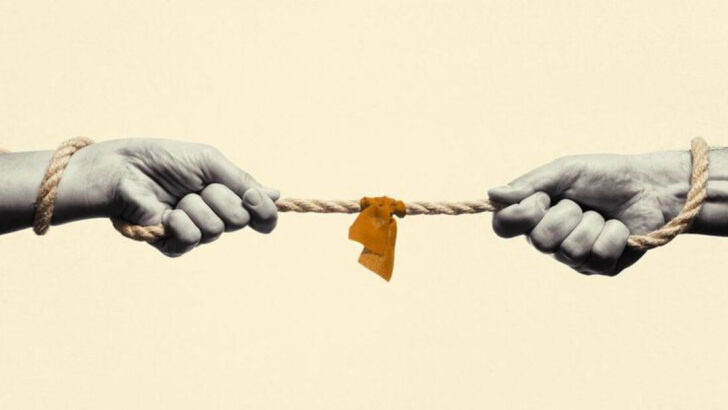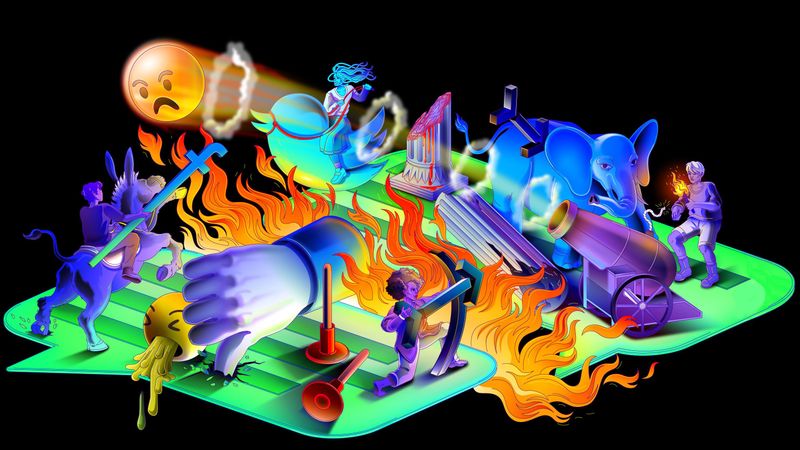Ever notice how power can turn even the nicest folks a little…well, strange? When you look back at the rules you used to follow (and maybe secretly hated), it feels like shaking free from a magic spell.
If you’ve ever found yourself nodding along to someone else’s orders, or bending your feelings for the sake of keeping the peace, you’re not alone—and you’re definitely not broken.
This is your very real, sometimes funny, sometimes painfully honest look at how power messes with our relationships and squeezes the empathy right out of the room. Here are 17 little rebellions—each one a step away from dominance and towards your own kind of freedom.
1. The Silent Treatment Olympics
Ever been caught in a battle of who-can-ignore-who-longer? The silent treatment used to be considered an Olympic sport in my house, and trust me, nobody ever won a medal. It’s wild how power can turn basic communication into a landmine field, where every word could be a trap.
Now, you know giving (or getting) the cold shoulder doesn’t make you mysterious—it just makes connection impossible. These days, you’d rather talk it out than freeze someone out. It’s amazing how much empathy creeps back in when you actually say what’s on your mind, even if it sounds messy.
And honestly, isn’t it exhausting to keep score on who’s more stubborn? Let’s retire the silence and bring back the awkward, honest convos—weird pauses and all.
2. The “My Way Or The Highway” Ultimatum
Raise your hand if you’ve been threatened with a choice that’s not really a choice. “My way or the highway” was basically the soundtrack of my twenties, blaring louder than any breakup song.
This kind of power move doesn’t leave room for compromise. Instead, it bulldozes right over feelings and turns every disagreement into a standoff worthy of a spaghetti western. But giving up your own needs just to keep the peace? Been there, bought the T-shirt, donated it to Goodwill.
Now, you call out ultimatums for what they are—emotional booby traps. Turns out, you can disagree without someone packing their bags (or threatening to). What a wild idea, right?
3. The Empathy Blackout
You ever notice how someone in charge suddenly can’t relate to basic human struggles? Empathy blackouts are real—like someone unplugged their feelings just to win an argument or seal a deal.
When you were stuck on the receiving end, you probably wondered if you had turned invisible. Now, you’ve learned that empathy isn’t a luxury—it’s the whole basis for trust and connection. Funny how vulnerability used to feel risky, but now it’s the best part of a conversation.
So if someone’s acting like a robot, maybe they’re just wearing the mask of dominance. Good news: you don’t have to wear one, too.
4. Decision-Making Dictatorship
Ever had every dinner order, movie choice, and vacation plan made for you? It’s like living with your own personal event planner who never asks what you want. Back then, going along felt easier than causing a scene.
But slowly, you realize that never having a say turns your dreams into background music. Now, you’re reclaiming your right to pick the pizza toppings—even if it means pineapple sparks a spirited debate.
Turns out, mutual decision-making isn’t just a chore; it’s a way to say, “Hey, I see you.” And isn’t that all anyone ever wants to feel?
5. The Disappearing Boundaries Magic Trick
Remember when your boundaries were more like suggestions than actual limits? Power has a way of blurring lines—suddenly, your time, space, and phone are never yours alone.
You used to apologize for needing privacy, waiting for permission to recharge. Now, you post a metaphorical “do not disturb” sign with pride. It’s liberating (and oddly thrilling) to say, “No, I’m not available,” and actually mean it.
If someone can’t respect your boundaries, that says more about them than it does about you. Magic trick reversed: you’ve reappeared in your own life.
6. The Empathy-Deficit Boss
Ever had a boss who couldn’t spell “team” without “me”? The empathy-deficit boss manages by intimidation and takes credit for every idea except your lunch order. Feedback? Not a chance.
Working for someone who values power over people can turn the brightest workplace into a black hole of motivation. But now, you know that real leadership lifts others up instead of stepping on them for a better view.
You left the fear-based culture behind and found your voice—even if it shook a little at first. Remember, the best bosses are the ones who remember what it feels like to be on the other side of the desk.
7. Gaslighting: The Invisible Manipulator
Ever found yourself doubting your own memory because someone insisted you were “too sensitive?” Gaslighting is the ultimate mind game, and power is its favorite tool. You start questioning everything, including your own reality.
Breaking free means trusting yourself again, even if your voice trembles at first. That moment when you catch the lie and choose to believe yourself instead of the manipulator? Pure magic.
Now, you spot gaslighting a mile away—and call it out without apology. Your reality is valid just as it is, and no amount of power plays can take that away.
8. The Control Freak’s Handbook
Do you remember when you thought perfection meant having everything your way? The control freak’s handbook was secretly your bedtime story—every chapter tighter than your grandma’s hugs.
But holding the reins all the time made everyone else anxious (and sometimes a little resentful). Now, you know that letting go isn’t losing control—it’s letting everyone breathe, including yourself.
Besides, the world doesn’t end if someone puts the mugs on the wrong shelf. Let chaos (and a little laughter) reign. The best memories are never perfectly organized anyway.
9. Emotional Withholding: The Great Freeze
Withholding affection as punishment? That’s the emotional equivalent of hiding the remote after losing the TV war. Power can turn love into a bargaining chip, making every hug or kind word feel like something to be earned.
But when you realize love shouldn’t be conditional, everything changes. You start to notice how much warmer life feels when you give and receive freely, without keeping score.
Your emotional thermostat is set to “generous” now—no more frosty silences. Turns out, being open is much cozier than winning a cold war.
10. The Always-Right Expert
Ever been in a conversation where someone always has the last word—or three? The always-right expert doesn’t just want to be heard; they want to be obeyed. Power loves a soapbox, even when no one asked for a speech.
Now, you see that admitting you’re wrong doesn’t shrink you—it makes you human. The freedom to say, “I don’t know” can be oddly exhilarating, especially after years of playing expert just to keep up appearances.
Conversations feel lighter now, less like a debate and more like a dance. You don’t need to win every argument; sometimes, listening is the real victory lap.
11. The One-Sided Compromise
Compromise is supposed to be a two-way street, not a one-lane road with all the traffic going your way. Remember those times you gave up what mattered to you, just to dodge an argument?
Looking back, you realize that long-term peace can’t be built on silent sacrifice. Now, you speak up for the wallpaper you actually like—even if it means clashing patterns and opinions.
As it turns out, standing your ground can be more satisfying than grudgingly going along. Decorating your life together means every corner has a bit of you in it, too.
12. The Puppetmaster’s Strings
If you ever felt like someone else was pulling your strings, you know how suffocating it can get. Power thrives on control, turning real people into background scenery for someone else’s show.
But the day you cut those strings, everything shifts. You rediscover how good it feels to move through life on your own terms—awkward dance moves and all.
Turns out, you’re far more interesting unscripted. The best connections are the ones where everyone’s in charge of their own story.
13. The Approval Addiction
Remember when someone else’s approval felt like oxygen? Power can turn you into a feedback junkie, measuring your worth in likes, compliments, or the absence of criticism.
Breaking free means embracing your quirks—even if they don’t get a standing ovation. You start to realize that self-acceptance tastes better than any gold star someone else hands out.
At this point in life, you post, speak, and show up just as you are. The only thumbs-up you really need? Your own.
14. The Chronic Interrupter
There’s always that one person who jumps into your story before you’ve hit the good part. Interrupting is the power move that says, “What I have to say is more important than what you’re saying.”
But when you finally get to finish your sentence, it’s like reclaiming a little piece of yourself. Listening turns out to be more powerful than talking, especially when it’s your turn to hold the floor.
Turns out, you don’t have to shout to be heard. Your voice matters—even if you need to politely ask for the mic back again.
15. The Emotional Scorekeeper
Ever kept mental tabs on every kind thing you did—or every time they forgot your birthday? The emotional scorekeeper turns love into a competition, and nobody ever wins the grand prize.
Letting go of the scoreboard means enjoying the present, not reliving every past mistake. You realize that relationships aren’t games—they’re shared adventures, with plenty of wrong turns and inside jokes.
These days, you focus on laughter, not ledgers. Forgiveness feels lighter than dragging around an emotional calculator all day.
16. The Dismissive Doubter
Have you ever opened up, only to be met with an eye roll or a “you’re overreacting”? Power loves to doubt—especially when someone else’s feelings don’t fit the script.
But now, you trust your emotions, even if they sound complicated or inconvenient. Every feeling has a story worth hearing, and you’re done apologizing for taking up space.
The best relationships are built on curiosity, not judgment. Turns out, validation is way more comforting than a patronizing shrug.
17. The Apology Avoider
Some people would rather swallow a live bee than admit they’re wrong. Power hates apologies, because saying sorry means giving up the high ground—even if it’s just for a second.
But when you start apologizing without a script, you notice the room gets lighter and so does your heart. Vulnerability isn’t weakness; it’s the glue that keeps relationships from cracking.
Now, you own your mistakes (and your bee-free breakfast). Turns out, “I’m sorry” is way more healing than pretending you’re perfect.


















